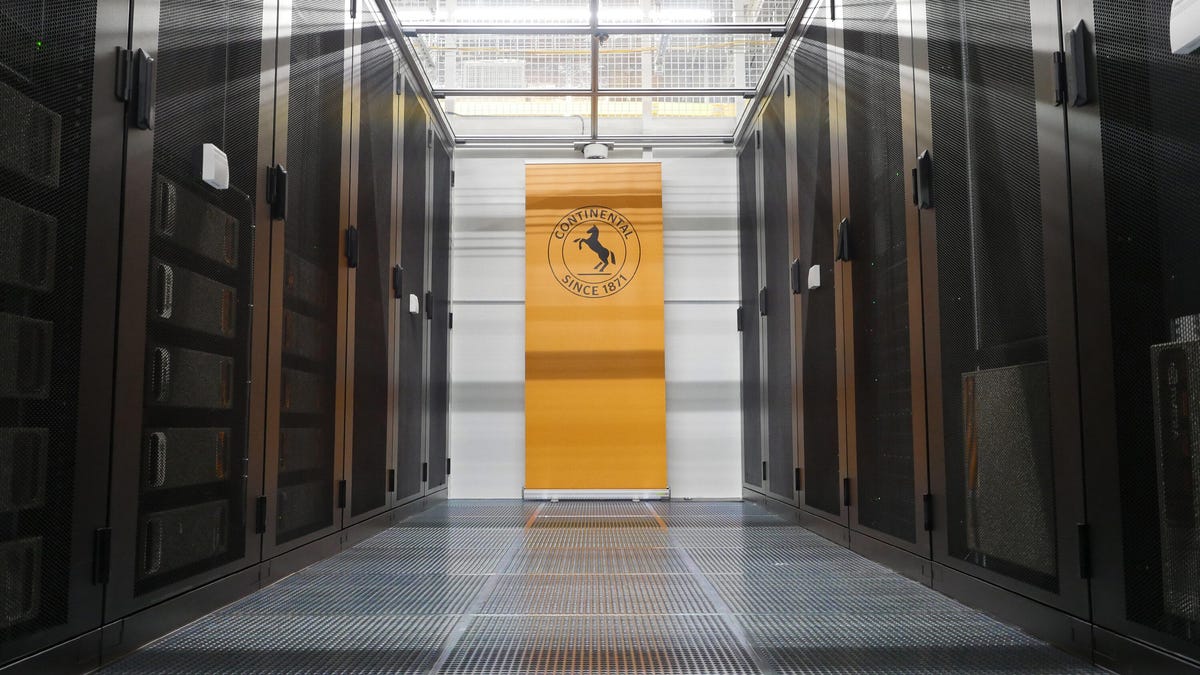Continental is supercharging the development of driver-assistance tech
The German firm is working with Nvidia to dramatically speed up the creation of features that will pave the way to autonomy.

There's not much to see here, but the processing power in this room is staggering.
No self-driving cars are available today, but like it or not, they're coming. Automakers and supplier companies around the world are hard at work developing the technology that will enable these autonomous machines. Accelerating its own efforts, German firm Continental has set up a new supercomputer specifically for developing advanced driver-assistance technologies.
The unit in question is built around more than 50 Nvidia DGX systems and has been up and running since the beginning of the year. This supercomputer dramatically increases Continental's number-crunching capabilities. In the same amount of time, researchers can now run more than 14 times as many tests as they could before.
It's difficult to say if this is the most powerful supercomputer in the automotive industry, but it's certainly near the top. "It puts Continental in a pretty good spot," said Phil van den Berge, Nvidia's vice president of automotive. Developing advanced driver-assistance technology is tremendously intensive work, he added, and having a purpose-built architecture like this one is a major help.
"That is now the game-changer," said Christian Schumacher, head of program management systems in Continental's advanced driver-assistance systems business unit. The new supercomputer can enable things the company only dreamt of doing just a decade ago.
Autonomous cars are coming whether you like it or not,
To help develop advanced automotive technologies, Continental operates a large fleet of evaluation vehicles around the world. Combined, they log around 9,300 miles of driving per day, collecting around 100 terabytes of data in the process. "In the past, it was impossible to deal with this [volume of] data," explained Schumacher. But thanks to the new computer, Continental can actually use it. He said tasks that took weeks to run can now be completed in just days -- a huge improvement.
Not only can this supercomputer chew through all the information collected from real-world testing, it can also generate data synthetically. "A lot of the situations out there we cannot predict," said Schumacher, so their new system can basically conjure up new simulations out of thin air. Of course, this sort of testing will never replace physical cars and actual driving, but he noted this capability is still hugely important in the development of driver-assistance tech.
And if they do run short of number-crunching capability, researchers and engineers can still tap into internet-based services for a little extra horsepower. Continental's new supercomputer is located in Frankfurt, Germany, a city with nearby cloud providers and other benefits. Helping keep the local environment just a little cleaner, Schumacher said, "We have certified green energy that is used to power the computer," which is air cooled and, as you might imagine, hungry for electricity.
Dude, you're getting a Dell... or rather, something much more powerful from Nvidia.
On the road to autonomy, "What we are currently targeting is … Level 2 [plus]," said Schumacher, which Continental is looking to roll out in the 2022-to-2023 timeframe. The SAE vehicle autonomy scale runs from Level 0, which offers no automation whatsoever, to Level 5, where the vehicle drives itself under all conditions. Level 2 provides things like lane centering and adaptive cruise control, while Level 3 throws traffic-jam assistance and automatic steering into the mix, though the driver must still pay attention and be able to take over if the system demands it.
Autonomous vehicles are not here yet, and it's debatable when they'll arrive, but they're likely just a little bit closer to reality now that Continental has invested in extra processing power.

